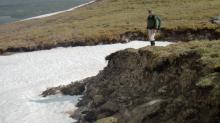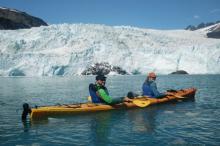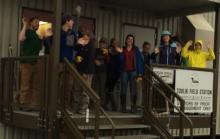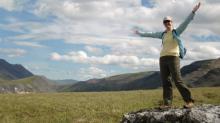Update
Archive of PolarConnect Event with Lauren from Alaska!
Lauren hosted a great event on Friday, 27 June 2014. Check out the audio, video, and slides in the PolarConnect Archives
What Are They Doing?
 Spring thaw on the tundra outside of Toolik Lake, Alaska
Spring thaw on the tundra outside of Toolik Lake, Alaska
Microbial diversity has recently been found to show a pattern of organization at various scales. The research team attempts to answer three basic questions about microbial diversity and dispersal, focused on the long-term aspects of dispersal events and climate change: 1) How does environment influence microbial community composition and rate of function? For example, how quickly they convert organic material to carbon dioxide. 2) How are distribution patterns of microbial communities in lakes, streams, and soils influenced by the dispersal from local water flow? 3) How are the shifts in microbial community composition related to shifts in environmental conditions over time such as those caused by climate change?
To date, the researchers have found that microbial communities in lakes and rivers change dramatically through the seasons but reassemble on an annual basis. They have also found that community composition in soil and surface waters shifts within days in response to environmental fluctuations in temperature or dissolved organic matter composition. They have also found that upland terrestrial habitats act as landscape-level seedbanks for lowland aquatic systems. The ultimate goal of the project is to develop a greater understanding of the controls on microbial community composition and function over space and time.
Where Are They?
 The view from Toolik Field Station, Alaska
The view from Toolik Field Station, Alaska
The research team was based out of Toolik Field Station, located on the Dalton Highway in the northern foothills of the Brooks Mountain range. The station is an 8-10 hour drive north from Fairbanks, Alaska. Toolik Field Station is operated by the Institute of Arctic Biology at the University of Alaska Fairbanks and has hosted hundreds of researchers and students every year since 1975. From the field station, the team traveled to their sites by foot, truck, and helicopter.
Latest Journals

Dr. Byron Crump has worked in the Arctic for over a decade exploring the biodiversity and ecology of bacteria and other microbes in lakes, streams and soils. Microbial communities are essential components of every ecosystem on the planet, and in recent years we have learned that the most abundant organisms in natural microbial communities are unrelated to the cultured organisms studied in the lab for the last 100 years. Microbial communities contain an extremely deep diversity and an immense genomic potential of novel functional genes. Dr. Crump is currently conducting a multi-year study of microbial community composition and growth rate in arctic lakes and streams on the North Slope of Alaska to measure how diversity and growth vary over time and are affected by global change. You can read more about Dr. Crump's research here.





